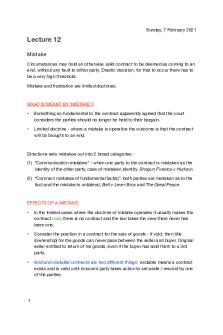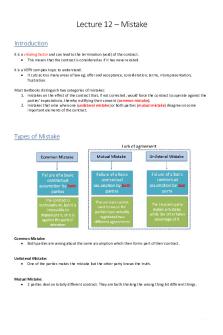Mistake - exam notes PDF

| Title | Mistake - exam notes |
|---|---|
| Course | Law of Contract |
| Institution | City University of Hong Kong |
| Pages | 7 |
| File Size | 245.5 KB |
| File Type | |
| Total Downloads | 29 |
| Total Views | 138 |
Summary
exam notes...
Description
1
Mistake
A. Common Mistake Situation where both parties hold a common mistaken belief as to the FUNDAMENTAL FACT Contract becomes VOID
Types of Common Mistakes 1. Mistake as to the existence of the subject matter (Res Extincta) Mistake based on the non-existent of goods Couturier v Hastie Facts
-
Court
-
A corn cargo was shipped to England; believing the corn to be in transit, the seller sold it to a party in England; unknown to them, the corn was unloaded and sold in Tunis, as it had begun to deteriorate seller argued buyer was nevertheless liable to pay the price for the cargo on the basis that buyer had assumed all risks The court held that the buyer was not liable for payment, because the seller did not bind himself as promising the existence of goods. Held that the seller was giving a warranty as to the existence to the good’s existence And because the contract plainly imports that there was something which was to be sold at the time of the contract.
2. Mistake as to the title (Res Sua) Cooper v Phibbs Facts
-
Cooper agreed to lease a fishery from Phibbs; although both parties believed that the fishery belonged to Phibbs, Cooper was already entitled to enjoyment of the fishery as a life tenant
Court
-
held that the contract can be set aside This principle has only a limited application – because a seller normally warrants that he has a valid title over the sold property
Griffith v Brymer 1903 Facts
-
-
Contract was for the hire of a room to view the coronation procession of King Edward VII was entered into a few days before the scheduled procession However, unknown to both parties at the time of the agreement, the scheduled procession had been
2
Mistake cancelled one hour earlier before the contract was entered into Court
Held contract void for common mistake The purpose of the room-hire service to view the coronation which had actually been cancelled and so became impossible to realize Distinguished from Krell v Henry case - In Krell case, the coronation procession was cancelled after the parties agreed to enter into the contract = case of frustration
-
3. Mistake as to the quality of the subject matter Quality refers to some special quality which relates to the substance of the subject matter Which goes to the root of the matter and sufficiently fundamental (Australia Royal Mail Co) A mistake as to the quality of the subject matter will not generally avoid the contract Leaf v International Galleries - The sale of a painting believed to be by a famous painter, John Constable - later this was found to be untrue after 5 years Court - Ruled contract cannot be set aside on the ground of mistake as it merely related to the quality - Bar to recession: Lapse of time. The action failed.
Facts
“Essentially difference” Test in the Great Peace Shipping Ltd v Tsavliris Salvage (International) Ltd TEST: Whether the performance according to the terms of the contract would be “impossible” with the common mistake of the quality of subject matter “Essentially different” almost equated with impossibility in Great Peace Shipping Ltd In Kyle Bay Ltd v Underwriters Subscribing case, - CA considered the test is whether it would render performance of the settlement agreement impossible.
Mutual Mistake Where the parties are at cross-purposes, it might not be possible to ascertain the contract terms even after applying an objective test So, the court may rule that there was no contract even if one or both parties may claim that a contract existed Contract is not void where only one party is mistaken as to the quality of the goods and the performance of the contract is possible (Smith v Hughes 1871)
Mistake
3
the Objective test Court will consider whether a reasonable third party would interpret the contract in line with the understanding of one or the other of the parties. If the court can find a common intention, the contract will be upheld. Raffles v Wichelhaus Facts: W agreed to buy from R 125 bales of cotton “to arrive [in England] ex Peerless from Bombay”; there were two ships called Peerless and both sailed from Bombay; W meant the Peerless which sailed in October, while R meant the Peerless that sailed in December Court: held that there was no contract: - “There is nothing on the face of the contract to show which Peerless was meant; so that this is a plain case of latent ambiguity, as soon as it is shown that there were two Peerless from Bombay ... the plaintiff meant one and the defendants the other. If this was the case, there was no consensus ad idem, and therefore no binding contract.” - Here, the court could not determine which Peerless was intended in the contract. So, mutual mistake was operative. There was no agreement and contract was void. Tamplin v James Facts: James believed that he bought in auction an inn and the two adjoining plots of ground; although the auction plan of Lot 1 clearly showed that the plots were not included in sale, he did not check the plan Court: ruled that James cannot plead mistake to avoid the contract performance. A party misunderstood the limits of the property he was buying because he had not bothered to examine the sale particulars.
On the Subject Matter of the Contract Where there is a mutual misunderstanding as to the subject matter of the contract, the contract may also be void. Legal Principle: If one party is found to have been responsible for bringing about the mistake, the court will favour the other party Scriven Brothers & Co v Hindley & Co 1913 Facts: D bid at an auction for two lots, believing both to be hemp. In fact, Lot A was hemp but Lot B was tow. Tow is considerably less valuable than hemp. Both lots contained the same mark, “SL”. The purchasers had been shown bales of hemp as “samples of the SL goods”. Moreover, it was unusual for different goods to be shipped under the same mark Court: Court considered that a reasonable third party could not determine whether the contract was for hemp or tow. Contract void.
4
Mistake A contract cannot arise when a person seeking to enforce it has by his own negligence caused or contributed to cause the mistake.
C. Unilateral Mistake If (1) only one party is at mistake and the (2) other party knows or ought to have known about it Contract may be void or voidable Mistake to the identity of the person The contract will be void for mistake only when (1) The identity of the contracting person is of fundamental importance to the contract (Cundy v Lindsay 1878) (2) This is made clear by the party who is mistaken before or at the time of the contract (Boulton v Jones 1857) Situation 1: Written contracts Cundy v Lindsay Facts
-
Court
-
-
Legal Principle
A rogue set up the business as Blenkarn at 37 Wood Street Lindsay supplied goods to him on credit believing that the goods were supplied to Blenkiron & Co at 123 Wood Street The rogue sold the goods to Cundy Held P can recover handkerchiefs from the defendants Contract void for mistake The plaintiff intended to deal with an identifiable party (Blenkiron & Co) whom they knew
King’s Norton Metal Co v Edtridge Merret & Co Ltd Facts
-
Court
-
Legal Principle
-
Pd e l i v e r e dg o od st oHa l l a m &Co. Ha l l a m&Cop u r po r t e dt ob eal a r g ec o mp a n ybu twa sa c t u a l l ya r o gu en a me dWa l l i s Up o nr e c e i p to fg o o d s , Wa l l i ss o l dt h e mt oD. Up o nd i s c o v e r i n gt hemi s t a k e , t h ePs o u gh tt or e c o v e rt h eg o o d sf r o m t h ed e f e n d a n t Rejected P’s claim. Court found P intended to contract with the author of the written correspondence, regardless of who that was In this case, there is only one existing entity P clearly intended to deal with that existing entity (whoever was using the name “Hallam & Co”). only creditworthiness
5
Mistake Situation 2: Face-to-face dealings
Strong presumption that: one party intends to deal with the other party who is in front of him Ingram v Little 1961 Facts - Ro g u ewa n t e dt ob u yac a rf r o mPs i s t e r s . Hep r o d u c e dc h e q u ef o rt he a gr e e da mo un tbu to n eoft h epl a i n t i ffr e f u s e dt oa c c e p tt h ec h e q u e - On eo ft h ep l a i n t i ffwe n tt ot hePos tOffic et oc h e c kt h et e l e ph o n e d i r e c t or yt oc o n fir mt h a tt h e r ee x i s t e ds u c hap e r s o n - Up o nd i s c o v e r y , t h ep l a i n t i ffa c c e p t e dt h ec h e q uea ndg i v et h ec a r k e y st oD - Af t e rt h e yf ou n do u tt h ec h e q uewa swo r t hl e s sa n ds ou g h t t or e c o v e r t h ec a rf r o mD Court
-
Legal Principle
-
Held void for mistake the presumption was rebutted because they refuse to accept rogue’s offer to contract by cheque until they have checked his identity This demonstrates that rogue’s identity was essential to the concluding of the contract and not only essential to the method of payment
Shogun Finance Ltd v Hudson Facts - A rogue impersonated as Mr. Patel and purchased a car on hire purchase - the finance company checked creditworthiness of Mr. Patel and approved the finance; the rogue forged Patel’s signature - later on the rogue sold the car to Hudson and disappeared Court
-
The majority held that no valid contract came into existence the House of Lords again ruled by 3:2 that a written contract made between the finance company and the rogue was void
Nature of a singed document – Non Est Factum Can be plead as a defence to claims brought in reliance upon a signed written contract where the party who signed the document was unaware of the true nature of the document at the time of signing Saunders v Anglia Building Society
Mistake
6
Equity If mistake is not operative, equity may be used in 3 possible ways: 1. Recission Available when it is unconscionable to allow one party to take advantage of the mistake (Sole v Butcher) Not available for common mistake (Great Peace Shipping Ltd v Tsavliris Salvage International Ltd) 2. Rectification (very rare) If the written contract fails to reflect the common intention of parties, courts may rectify the mistake in appropriate cases Frederick Rose Ltd v William Pim Junior Ltd Facts: Rose were asked by an Egyptian firm to supply them ‘Moroccan horsebeans described here as feveroles’; Rose asked Pim what feveroles were, who replied that they were horsebeans; Rose then purchased ‘horsebeans’ from Pim and supplied them to the Egyptian firm; since the Egyptian firm found that the horsebeans were not feveroles, they sued Rose for damages; Rose sought rectification of their contract with Pim to make it read ‘feveroles’ Court: Held - that the contract is valid even if both parties had mistakenly thought that ‘feveroles’ were the same as horsebeans. It refused rectification because both oral and written contracts were for horsebean: “Rectification is concerned with contracts and documents, not with intentions.” If the mistake concerned the meaning of a particular term in the contract, then rectification will not be available (Frederick E Rose London Ltd v William H Pim Junior & Co Ltd 1953) Courts in equity can: refuse specific performance of a contract rescind a contract rectify a contractual document Bell v Lever Brotherswhere the mistake was about the quality of the subject matter Facts: Lever Brothers appointed B & L for 5 years (service contracts). Later it was discovered that B & L had some private business dealings in breach of their service contracts Lever Brothers agreed to pay £50,000 for terminating service contracts before 5 years (compensation contracts) Co u r t :The House of Lords, by a narrow majority of 3:2, held the contract to be valid Solle v Butcher (Butcher leased a flat to Solle for seven years at £250 per annum; both (wrongly) believed that the flat was not subject to the rent control law, otherwise the rent would have been only £140, unless a statutory notice was given on account of repairs made;
Mistake
7
Solle sought to recover the overpaid rent) Lord Denning in Solle ruled that such contract should be voidable under equity – Solle can either surrender the lease or continue to pay the full rent However, this equitable approach to deal with common mistake was rejected later in Great Shipping Ltd v Tsavliris Salvage (salvage of ‘Great Providence’ by ‘Great Peace’; the two vessels were 410 miles apart, rather than the believed distance of 35 miles; since another vessel was found close to ‘Great Providence’, the contract with ‘Great Peace’ was cancelled) So, there is no separate equitable jurisdiction to render a contract voidable Does not violate the contract and make it impossible to perform. So it is still a valid contract....
Similar Free PDFs

Mistake - exam notes
- 7 Pages

Mistake - Exam summary
- 5 Pages

Mistake - Lecture notes 3
- 3 Pages

Mistake
- 4 Pages

3.0 Case Notes on Mistake
- 29 Pages

2. Cross-purpose mistake notes
- 2 Pages

Lecture notes, Mistake of Fact
- 5 Pages

(12) Mistake - Lecture notes 12
- 8 Pages

Mistake Tutorial
- 4 Pages

MISTAKE OF LAW VS MISTAKE OF FACT
- 14 Pages

Mistake and frustation
- 20 Pages

Honest and reasonable mistake
- 24 Pages

IRAC - Common Mistake
- 5 Pages
Popular Institutions
- Tinajero National High School - Annex
- Politeknik Caltex Riau
- Yokohama City University
- SGT University
- University of Al-Qadisiyah
- Divine Word College of Vigan
- Techniek College Rotterdam
- Universidade de Santiago
- Universiti Teknologi MARA Cawangan Johor Kampus Pasir Gudang
- Poltekkes Kemenkes Yogyakarta
- Baguio City National High School
- Colegio san marcos
- preparatoria uno
- Centro de Bachillerato Tecnológico Industrial y de Servicios No. 107
- Dalian Maritime University
- Quang Trung Secondary School
- Colegio Tecnológico en Informática
- Corporación Regional de Educación Superior
- Grupo CEDVA
- Dar Al Uloom University
- Centro de Estudios Preuniversitarios de la Universidad Nacional de Ingeniería
- 上智大学
- Aakash International School, Nuna Majara
- San Felipe Neri Catholic School
- Kang Chiao International School - New Taipei City
- Misamis Occidental National High School
- Institución Educativa Escuela Normal Juan Ladrilleros
- Kolehiyo ng Pantukan
- Batanes State College
- Instituto Continental
- Sekolah Menengah Kejuruan Kesehatan Kaltara (Tarakan)
- Colegio de La Inmaculada Concepcion - Cebu


